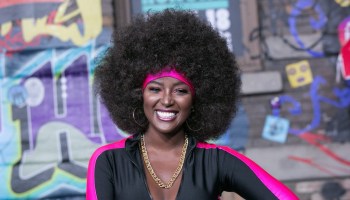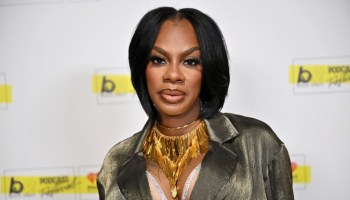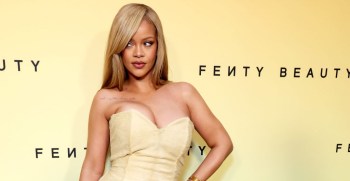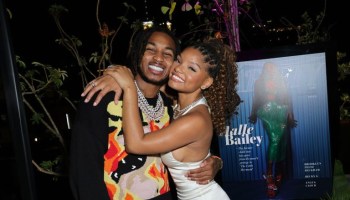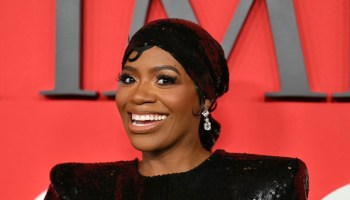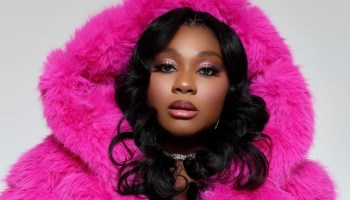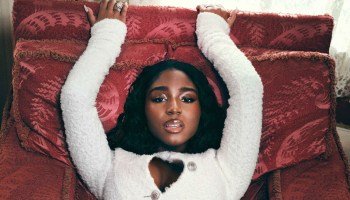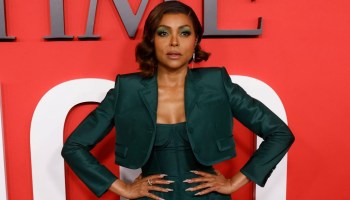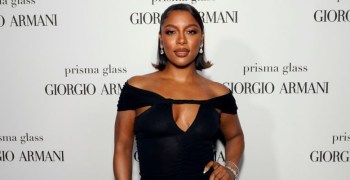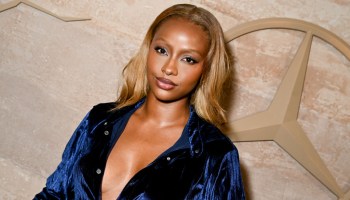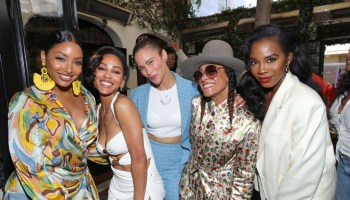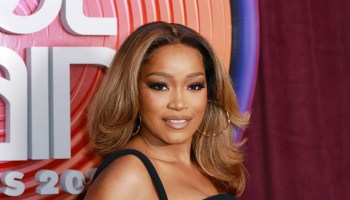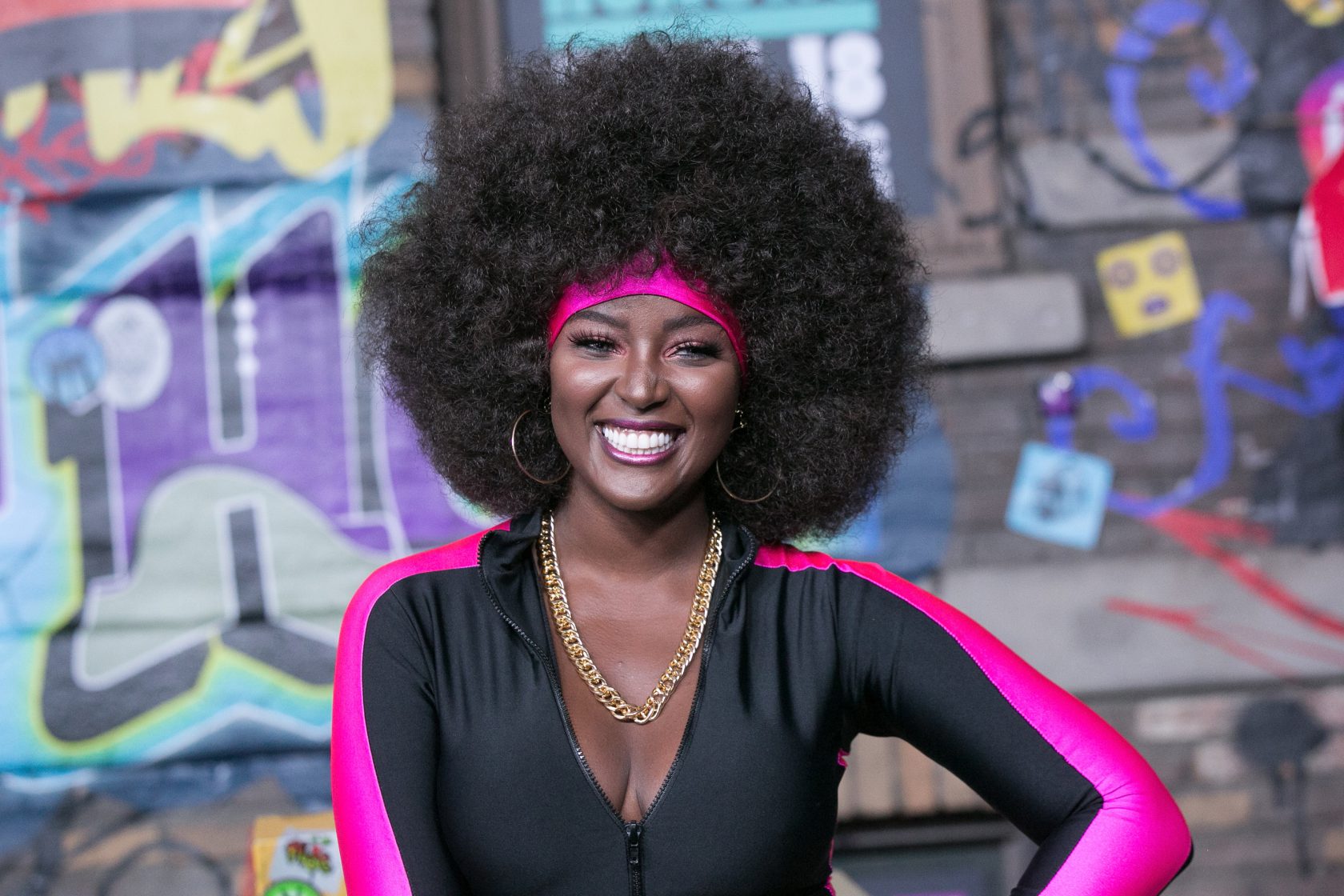
Source: Gabriel Olsen / Getty
Amara La Negra walks into the New York Times for their Black History Month panel and you would think she owns the place. Her effervescent nature and vivacious personality keeps all eyes on her and the room tracks her every move. She sits and the front and says, “Hi everybody!” in her thick Latinx accent that you would recognize even if you weren’t looking.
Amara is like an open book and it’s one of those rare, early interviews where you see the woman for who she is, without the full media training. She’s a mix between the Bronx realness of Cardi B. (Amara was born in Miami) with the dollface beauty of Janet Jackson in her heyday. Nevertheless, don’t go drawing comparisons, because Amara La Negra is in a class of her own. The conversation in honest, unfiltered, and uncensored.
https://www.instagram.com/p/BfQ1u6yBU0j/
There’s nothing that’s off the table, though she occasionally glances over at her manager and not-so-jokingly jokes that she has to be careful what she says. The breakout star was thrown into the spotlight not only just because of Love and Hip Hop Miami, but also because how she has thrown the colorism conversation into the popular limelight.
RELATED: EXCLUSIVE: Viola Davis On Skincare, Coming To Faith, And Why She Loves ‘Insecure’
When asked her thoughts on the Love And Hip Hop franchise being a negative depiction of women of color, Amara replies,
“I hate when they say Love And Hip Hop makes Black women or Black people look a type of way. I don’t feel that way. I feel they put a camera in your face and what you do in that time is up to you. If you wanna get loud and be like ‘ahhhh!’ and do all that stuff bc you wanna get that camera time, that’s what you choose to do. They didn’t tell you to do it. A lot of people think Love And Hip Hop is scripted, but it’s not. They don’t tell you flip that cup, do this, say that. I feel if you use the platform properly, you can do a lot of big things.”
The platform has certainly set up a foundation for Amara to do just that. She mentions wanting to start a line of dolls (including dark skin dolls) in addition to her music (her new single Insecure is coming out soon). It’s clearly more than just a pretty face and curvaceous body when it comes to Amara, though she knows how looks centered the world can be. She adds, “I think people hear but they don’t listen. They don’t hear between the lines of what I’m saying. If you really pay attention to what I’m saying, you’ll get more than, ‘Ah, she’s cute! She’s pretty! The fro! We like it.'”
While her chocolate brown skin (which has been accused of getting melanin shots or laying in the sun to be that dark) or her beautiful curly afro (which people doubt are real), Amara has gotten picked apart, “This world is not meant for the weak. Mama, get it together,” she adds, almost as if she’s talking to all the women in the audience. “You can’t let the comments…” she trails off, “Everything is questioned about me. Every single thing.”
https://www.instagram.com/p/Be62Cg_AJXt/
Her hair has been the topic of discussion on the Internet. She isn’t even asked the question, but addresses it head-on: “Dominicans are known for doing really good hair. That’s just the thing that we have.” She explains her past with her hair, “As a Caribbean woman, my mom used to perm my hair. For many years, I had straight hair.” Amara discusses growing up and attending dance classes and perming her hair made it more “manageable.” Her afro is all hers and like everyone else, she adds some pieces. Amara exclaims, “Do you know how hard it is to keep a perfectly shaped afro, all the time?!” We feel you girl.
Amara’s mom immigrated through the Mexican border, she adds, “The same border they want to shut down,” and winces slightly. Amara reveals to the crowd, “My mom buried three sons before me. My mom doesn’t have anymore children, it’s just me and her. That’s why I always say it’s me and her against the world. It was me, my mom, and her friends, my ‘aunties’ that would come and go. That’s how I grew up.” Family is important to Amara and is now has a budding relationship with her father. She says, “I try to be a good daughter, even though he’s not a good father because I feel that God will punish me.”
Amara discusses her extended family in the Dominican Republic and her frustration with how they only see her for ‘speaking English’ on American TV and not the racial work she is doing. They don’t get it. What I’m doing to them, they just think I’m on the American TV. They don’t pay attention to the fact that I’m talking about colorism or a bigger issue. She explains, “They don’t get it. What I’m doing to them, they just think I’m on the American TV. They don’t pay attention to the fact that I’m talking about colorism or a bigger issue.” Amara goes deeper into the differences in the culture between America and the Dominican Republic,
“In the DR, they have mocked me doing Blackface. Literally, whole Blackface. Fro, butt pads, everything. It doesn’t mean anything in my country. It’s fun! ‘Ah, they are making fun of Amara.’ You do that over here? Guess what, you’re gonna get it. What’s wrong here, isn’t seen as wrong there. Our history is different.”
However, it’s not just the Dominican Republic. In America, Amara is also dealing with the joys of the spotlight as well as our nasty history of racism and colorism in this culture. She mentions, “I get called a nigger all the time. I get all types of stuff. I get it. Now that I’m in the spotlight, it’s not just the community that’s supporting me, it’s the one that don’t support me too.”
https://www.instagram.com/p/BfJ9pt4gE8D/
Throughout the entire conversation, while Amara discusses her family, her hopes, what’s next, she ensures that she makes sure to educate the crowd on Afro-Latina culture and the African diaspora in her way and words. She earnestly tells the crowd, “I want my life to matter. I want to leave my print here. I want years later for people to remember me. I stood up for what I believed. Not only did I do my music but I made a difference.”
RELATED: Cardi B’s Sister Hennessy Comes For Amara La Negra Over Colorism Debate
Amara is open about the colorism in the industry, boldly calling out major networks like Univision and Telemundo for only having a ‘certain’ type of Latina representation on screen. She explains, “A Latina to them, should look like J.Lo, Salma Hayek, Shakira…that’s Latina. But if you look like me, that’s not Latina.” Amara then goes into a story of how a woman pulled her aside after she auditioned for a role and said to her, “‘I know you really want this role and I know this is messed up, don’t take this personal’, I was like, I won’t go for it: ‘Listen, We won’t be calling you for any novellas anytime soon. And if we do, I know it’s messed up but if we’re doing a novella about slaves or if the main characters go to the Bahamas, you can be there. Or a drug addict or a prostitute.‘ >>the crowd gasps and exclaims<< That’s exactly what she said. It killed me she was so open to literally say that, if we do a movie about a slave or something, we’ll call you. But as a Latina, none of these roles will be for you.” I was impressed to see Amara, still building her career, speaking out against the same networks that could supposedly make or break her in her community.
Amara discusses the importance of representation in the Afro-Latina community and ties in her love for Celia Cruz. She says, “I was looking for someone that I could be like, ‘OhmyGodwhenIgrowupImgoingtobejustlikeher.’ Just like Beyonce! Girls can say, ‘Oh my gosh, I wanna just be like Beyonce,’ because they have that option. Celia Cruz was the only artist in my generation that was able to be a worldwide artist, being an Afro-Latina singing Afro-Cubana, salsa, rumba. I admired her so much because she was so humble. I did backup dancing for her on three occasions. Unfortunately, when she passed away, I didn’t have much option than to look at.” She talks of her love for Tina Turner and other African-American artists while adding, “I don’t think it’s fair in our community, we can’t give our people (Afro-Latina) that option to be like, ‘One day I want to be that.‘”
Amara is well on her way for being a voice and representation for Afro-Latina women everywhere. She firmly tells the audience, “I’m going to keep the conversation going until I see a difference.”
We’re behind you all the way, Amara.
DON’T MISS:
‘LHHMIA:’ Amara La Negra Has The Fakest Friends Ever
Amara La Negra Schools Charlamagne Tha God And DJ Envy On Colorism [VIDEO]
Cardi B’s Sister Hennessy Comes For Amara La Negra Over Colorism Debate

